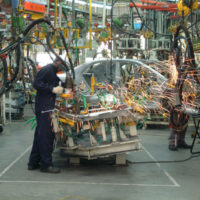Most Common Factory Worker Injuries
August 14, 2019 America depends on factory workers to keep the economy strong. Working in a manufacturing plant requires strength and speed, and employees often labor under hard conditions. In fact, manufacturers often expose industrial workers to hazards every day. Occasionally, these hazards can lead to injuries that require trips to the doctor, surgeries, physical therapy, time off work, and even job changes. Below are five of the most common types of injuries that factory workers experience.
America depends on factory workers to keep the economy strong. Working in a manufacturing plant requires strength and speed, and employees often labor under hard conditions. In fact, manufacturers often expose industrial workers to hazards every day. Occasionally, these hazards can lead to injuries that require trips to the doctor, surgeries, physical therapy, time off work, and even job changes. Below are five of the most common types of injuries that factory workers experience.
Repetitive Motion Injuries
When someone does the same thing over and over, the muscles, ligaments, and other soft tissues can suffer strains, sprains, and tears, as well as other conditions related to inflammation. If these injuries are not treated by a doctor, they can get worse and lead to damage to the other parts of the body. They may even contribute to problems that cause them to become permanently disabled, such as severe back pain.
Hand and Arm Injuries
If a worker accidentally gets caught in a machine, he or she can suffer severe injuries, including fractures, degloving injuries, crush injuries, and amputations. Often these injuries happen in defectively designed machines and equipment that lack proper safety features, like guards, interlock switches, and/or switch mats.
Poisoning and Illnesses
In some manufacturing workplaces, the air becomes heavy with chemicals and other airborne toxins. These can cause everything from respiratory diseases to constant colds. Workers who have been poisoned or exposed to toxins should call their doctor or go to an emergency room. A good example of an airborne toxin is asbestos, which has been linked to the deadly cancer, mesothelioma.
Hearing Loss
With so many machines running, factories can be loud places. If workers have not been given proper protective equipment, they may suffer partial or even total loss of hearing. Hearing loss can make life difficult both on the job and at home. Workers who have lost some of their hearing due to on-the-job injuries may be entitled to Workers’ Compensation benefits.
Injuries From Falling Objects
A final common type of factory worker injury is being hit by a falling object. The object could fall from a piece of equipment, a shelf, or other high place. Depending upon how heavy the object is and other factors, the worker could sustain very serious injuries.
Workers’ Compensation and Factory Injuries
Nearly all employers in the United States must carry Workers’ Compensation insurance. Workers’ Compensation insurance pays for injured employees to get the medical care they need and covers the time they are off the job. This allows them to heal so they can return to work, if possible. Injured workers who have been denied benefits or suffered an injury related to a defective product should contact an experienced work injury lawyer to help them make the best decisions.
Third Party Liability
Your employer may not be the only one responsible for your injuries. In addition to filing a claim through the Pennsylvania Workers’ Compensation system, injured workers may also be entitled to file a lawsuit against other potentially responsible parties.
While Workers’ Compensation can compensate injured workers for medical bills and lost wages, other damages such as pain and suffering, are not reimbursable. An injured worker must file a “third-party liability lawsuit” in order seek compensation to which they are entitled from other responsible parties.
One of the most common types of third-party liability claims involves a design, manufacturing or marketing defect of a product or equipment used at work. Malfunctioning and defective equipment can cause serious and often catastrophic personal injuries, like those described above.
Injured Factory Workers Rely on the Philadelphia Work Injury Lawyers at Galfand Berger LLP for Help After an Accident or Exposure
Have you been injured during a factory accident? Were you exposed to a chemical or toxin? Contact the Philadelphia work injury lawyers at Galfand Berger LLP to talk about what happened. Call our office at 800-222-USWA (8792) or complete an online contact form. We serve injured factory workers from Pennsylvania areas including Philadelphia, Reading, Bethlehem, Allentown, Harrisburg, as well as clients from the state of New Jersey.
 Google Screened
Google Screened
